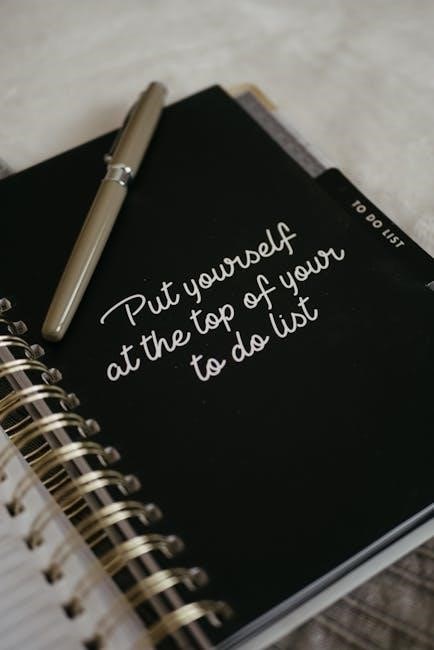Preparing a maternity bag is essential for a smooth transition to motherhood. It ensures comfort, practicality, and readiness for both mom and baby during the hospital stay.
Why Prepare a Maternity Bag?
Preparing a maternity bag is crucial to ensure a smooth and stress-free experience for both mom and baby. It allows expectant mothers to feel organized and ready for the hospital stay, avoiding last-minute chaos. Having all essentials packed in advance makes a significant difference during a critical time. A well-prepared bag ensures comfort, practicality, and peace of mind, covering everything needed for labor, recovery, and the baby’s first days. It also helps balance practicality with personal comfort, making the transition to motherhood easier. Whether it’s clothing, toiletries, or medical documents, a thoughtfully packed maternity bag is indispensable for a serene and confident start to parenthood.
When to Start Preparing the Bag
It is recommended to start preparing the maternity bag around the 32nd to 35th week of pregnancy. This timeline ensures everything is ready well in advance, avoiding last-minute stress. Packing early also allows time to check and update the contents based on hospital policies or personal preferences. Additionally, having the bag prepared early provides peace of mind, knowing everything is organized and accessible when the time comes. Many expectant mothers find it helpful to create a checklist and gradually add items as the due date approaches. Early preparation also accounts for unexpected early arrivals, ensuring both mom and baby are ready for a smooth transition.

Mom’s Essentials
Mom’s essentials ensure comfort and practicality during labor and recovery. Include 2-3 comfortable outfits, undergarments, a robe, toiletries, hair accessories, and a phone charger for convenience.

Clothing for Labor and Recovery
Packing comfortable and practical clothing is crucial for labor and recovery. Include 2-3 nightgowns or loose t-shirts for labor, as well as undergarments and a nursing bra for breastfeeding. A soft robe and warm socks can provide comfort during your hospital stay. Don’t forget a going-home outfit for both mom and baby. Opt for breathable fabrics and easy-to-move-in designs to ensure relaxation. Consider including a few pairs of comfortable underwear, as hospitals often provide pads for postpartum bleeding. A cozy pair of slippers or slipper socks can also enhance comfort during walks around the hospital. Ensure all items are easy to pack and wash for convenience.
Personal Care Items
Packing essential personal care items ensures comfort and hygiene during your hospital stay. Include a toothbrush, toothpaste, and dental floss for oral hygiene. A hairbrush or comb, along with hair ties, can help keep your hair tidy. Bring travel-sized toiletries like shampoo, conditioner, and body wash to save space. Don’t forget deodorant, lip balm, and any personal skincare products. Include makeup and makeup remover if desired for photos. Pack feminine hygiene products, including pads or period underwear, as hospitals may provide limited supplies. A small supply of tissues and hand sanitizer is also useful. Remember to include any personal medications or supplements as prescribed by your healthcare provider. These items will help you feel fresh and comfortable throughout your stay;
Comfort and Relaxation
To ensure a comfortable experience, pack items that promote relaxation and ease during your stay. A cozy robe or peignoir can provide warmth and comfort. Include a nightdress or comfortable clothing for labor and recovery. A pillow and blanket from home can offer familiarity and relaxation. Consider adding a music player or white noise app for calming sounds. A book, magazine, or tablet can help pass time. Healthy snacks like nuts or energy bars are great for quick energy. Don’t forget a phone charger for entertainment or staying connected. A hairbrush and small mirror can help you feel refreshed. These items will help create a soothing environment, making your hospital stay more enjoyable for both you and your baby.

Baby’s Essentials
Pack essential items for your newborn, including bodysuits, pajamas, socks, hats, and onesies. Bring diapers, wipes, and a changing pad. Include bibs, pacifiers, and a going-home outfit.
Clothing for the Newborn
Include essential clothing for your baby’s first days. Pack 4-6 bodysuits or onesies, 2-3 pajamas, and 2-3 pairs of socks. Add a warm hat, a cozy sweater, and a lightweight blanket. Bring a going-home outfit in size 1 month or 0-6 months. Opt for soft, breathable fabrics to ensure comfort. Consider the season and pack accordingly—lighter fabrics for summer, warmer layers for winter. Don’t forget bibs and burp cloths for feeding. Choose items that are easy to change and comfortable for the baby. Avoid tight or scratchy materials to prevent irritation. Ensure all clothing is clean and ready for use. This will make the transition to parenthood smoother and more enjoyable.
Diapering and Skincare
Essential items for diapering and skincare are crucial for your baby’s comfort. Pack a sufficient supply of diapers in various sizes (1-2 boxes) and wipes (1-2 packs). Include a diaper cream, gentle baby oil, and soft, fragrance-free baby lotion. Bring a changing pad or mat for convenience. Don’t forget bibs, burp cloths, and a small laundry bag for soiled clothes. For skincare, include gentle cleansing products and moisturizers suitable for newborns. Ensure all items are hypoallergenic to prevent skin irritation. A small bottle of water for cleaning and a soft washcloth can also be useful. These essentials will help maintain your baby’s hygiene and comfort during the hospital stay and early days at home.

Other Baby Necessities
Beyond clothing and diapers, there are several other essential items to include in your maternity bag. A soft blanket or swaddle for warmth and comfort is a must. Bring a few baby hats and pairs of baby socks to keep your little one cozy. A pacifier, if you plan to use one, can help soothe your baby. Don’t forget a going-home outfit for your baby, typically in size 1-3 months. Include a few baby towels and washcloths for grooming. A baby monitor or a baby carrier can also be useful for the first days. Lastly, ensure you have a car seat ready for the trip home, as hospitals require it for discharge. These items ensure your baby’s comfort and safety during the early days.

Important Documents
Pack medical records, insurance cards, and personal ID. Include a birth plan, emergency contacts, and blood type information for a smooth hospital experience.
Medical and Insurance Documents
Ensure all medical and insurance documents are packed. Include your insurance card, medical records, and any relevant test results. Bring a copy of your birth plan and emergency contact list. Don’t forget your blood type documentation and hospital registration papers. These documents are crucial for a smooth admission process and ensure healthcare providers have necessary information. Organize them in a dedicated folder for easy access. Double-check with your healthcare provider for any specific requirements. Having these documents ready avoids last-minute stress and ensures everything is in order for a safe and organized experience.
Personal Identification
Pack essential personal identification documents to ensure a smooth hospital experience. Include a valid government-issued ID, such as a driver’s license or passport, and your social security card. Bring a copy of your marriage certificate or partnership document if applicable. For international parents, include any relevant visa or residency documents. Additionally, pack a copy of your family book or birth certificates for legal purposes. These documents are crucial for hospital registration and verifying parental rights. Keep them in a separate, easily accessible folder to avoid delays. Check with your hospital for any specific ID requirements. Organizing these documents in advance ensures peace of mind and simplifies the admission process. Always carry originals and copies for verification.
Birth Plan and Preferences
Including a birth plan in your maternity bag ensures your preferences are respected during labor and delivery. Write down your wishes for pain management, labor positioning, and epidural use. Specify if you prefer natural childbirth or medical interventions. Note your stance on induced labor, episiotomy, or cesarean section. Mention preferences for music, lighting, or companions during labor. Include contact information for your pediatrician and any religious or cultural practices. Pack a copy of your birth plan and discuss it with your healthcare provider beforehand. This document helps communicate your desires clearly, ensuring a personalized experience. Keep it in an easily accessible folder with other important documents for quick reference during admission.

Toiletries and Personal Care
Pack essential toiletries like toothbrush, toothpaste, hairbrush, and shower gel. Include shampoo, conditioner, and lip balm. Don’t forget baby toiletries and comfort items like hair ties or snacks.
Mom’s Toiletry Bag
A well-prepared toiletry bag for mom is crucial for comfort during and after labor. Include essentials like a toothbrush, toothpaste, and dental floss. Add a hairbrush or comb for personal grooming. Pack travel-sized shampoo, conditioner, and shower gel to save space. Don’t forget deodorant, makeup, and makeup remover if desired. Include a supply of sanitary pads, as hospitals often provide them but personal preferences vary. Lip balm and hand cream can soothe dry skin. Hair ties or clips are useful for keeping hair back. A small mirror and any personal hygiene items, like wipes, should also be included. Ensure all items are easily accessible and stored in a clear, zippered bag for convenience.
Baby’s Toiletries
For your newborn, essential toiletries should be packed to ensure their comfort and hygiene. Include a supply of diapers in various sizes, as well as baby wipes for gentle cleaning. Bring soft, fragrance-free baby washcloths and a mild shampoo specifically designed for infants. A baby lotion and oil can help keep their skin moisturized. Don’t forget baby towels, bibs, and pacifiers if needed. Nail clippers and a thermometer are practical additions. A small changing pad can also be useful. Remember to pack burp cloths and a few extra outfits in case of spills. Finally, include a travel-sized baby laundry detergent for any unexpected stains. Ensure all items are safe for your baby’s sensitive skin and easily accessible in a separate, clearly labeled bag.
Shared Essentials

Shared essentials are items that both mom and baby may need during the hospital stay. These include snacks like granola bars and nuts for quick energy, as well as bottled water to stay hydrated. Documentation such as insurance cards, identification, and emergency contact lists are crucial for both parents. Comfort items like extra blankets or a shared pillow can provide reassurance. Hygiene products like hand sanitizer and wet wipes are useful for both. Electronics, including phone chargers and a portable charger, ensure devices remain powered. A notebook and pen can be handy for noting important information or questions for healthcare providers. These shared items help ensure both mom and baby are comfortable and prepared during their time at the hospital.

Additional Tips and Reminders
Double-check the hospital’s policies and pack essentials. Keep the bag organized and easily accessible. Ensure all necessary documents and items are included for a smooth experience.
Packing Smart
Packing smart involves organizing items efficiently to ensure easy access. Use compartments or small bags for similar items, like toiletries or baby clothes. Verify the hospital’s policies to avoid overpacking. Keep essentials like snacks, phone chargers, and documents in reachable spots. Fold clothes neatly to save space and prevent wrinkles. Consider a separate bag for post-discharge items. Ensure the bag is lightweight yet sturdy. Double-check the checklist to avoid missing anything. Pack a going-home outfit for mom and baby. Keep personal care items in a dedicated toiletry bag. Label each section for quick identification. Avoid overloading the bag—only pack what’s truly necessary. Ensure everything is ready to grab when the moment arrives. Stay organized for a stress-free experience.
Checking the Hospital’s Policies
Before finalizing your maternity bag, it’s crucial to check the hospital’s specific policies. Many hospitals provide a checklist of permitted items, but these can vary. Some may restrict certain personal care products or require specific medical forms. Knowing what’s allowed ensures you avoid packing unnecessary items. Additionally, inquire about any items the hospital provides, such as toiletries or linens, to avoid duplication. Confirming these details helps tailor your packing list to meet their requirements. This step ensures compliance and reduces stress during admission. Always contact the hospital in advance to clarify their guidelines, as policies can change. Being informed guarantees a smoother experience for both mom and baby. Proper preparation aligns with their expectations, making the process more efficient. Always prioritize their recommendations for a hassle-free stay.
Last-Minute Checks

Before heading to the hospital, conduct a thorough review of your maternity bag. Ensure all essentials are packed and easily accessible. Check the weather to include seasonal items like warm blankets or light clothing. Verify that all personal care products, toiletries, and comfort items are included. Double-check the condition of clothing and ensure it’s clean and suitable for the hospital stay. Confirm that important documents, such as medical records and insurance cards, are organized and within reach. Pack practical items like snacks, water, and phone chargers for comfort during labor. Finally, ensure your partner or support person knows where the bag is located; This final review helps prevent last-minute stress and ensures everything is ready for a smooth experience.
Prepared with thought and care, your maternity bag ensures a smooth, stress-free experience for both mom and baby. Pack with love and confidence for the big day ahead.
Final Checklist
Ensure all essentials are packed, from comfortable clothing and personal care items to medical documents and baby necessities. Double-check the hospital’s policies and pack a small day bag for last-minute items. Organize items by category for easy access, and confirm the bag is ready by 36 weeks. Include a finalized birth plan, insurance cards, and personal identification. Don’t forget snacks, chargers, and comfort items like pillows or music. Review the checklist with your partner to avoid missing anything. Lastly, place the bag near the door to grab quickly when it’s time to go. A well-prepared bag ensures peace of mind for a joyful and stress-free experience.
Staying Organized
Organizing your maternity bag is crucial for efficiency and reducing stress. Use compartments or small bags to categorize items like clothing, toiletries, and documents. Label each section clearly so you and your partner can find things quickly. Keep frequently used items, such as snacks and phone chargers, in easy-to-reach places. Consider a checklist taped to the bag to ensure nothing is forgotten. Pack essential documents in a separate, easily accessible folder. Maintain a tidy arrangement to avoid rummaging through the bag during your hospital stay. This structured approach ensures everything is within reach, allowing you to focus on welcoming your baby with confidence and calmness. A well-organized bag is a key to a smooth and enjoyable experience.
